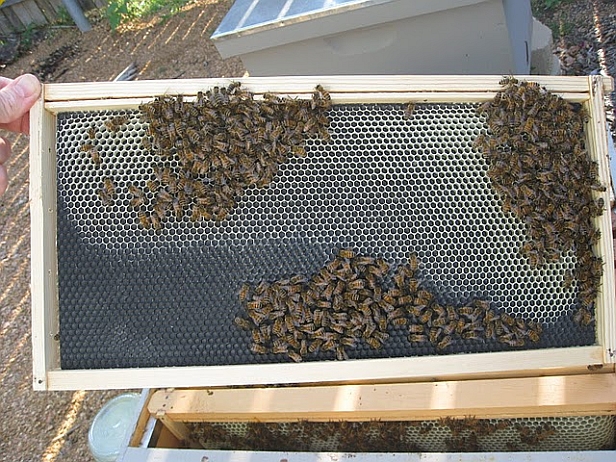This has to be the most amusing beekeeping story to come out of Brooklyn in at least a few weeks: A beekeeper in the gentrifying Red Hook neighborhood finds her bees returning from their foraging with strange red markings. She hunts for a source and finds her way to a Maraschino cherry factory. Mystery, whimsy, and a musing about cultural divides ensue. Susan Dominus reports for The New York Times:
Of course, it was the foragers — the adventurers, the wild waggle dancers, the social networkers incessantly buzzing about their business — who were showing up with mysterious stripes of color. Where there should have been a touch of gentle amber showing through the membrane of their honey stomachs was instead a garish bright red. The honeycombs, too, were an alarming shade of Robitussin.
An acquaintance, only joking, suggested the unthinkable: Maybe the bees were hitting the juice – maraschino cherry juice, that sweet, sticky stuff sloshing around vats at Dell’s Maraschino Cherries Company over on Dikeman Street in Red Hook.
“I didn’t want to believe it,” said Ms. [Cerise] Mayo, a soft-spoken young woman who has long been active in the slow-food movement. She found it particularly hard to believe that the bees would travel all the way from Governors Island to gorge themselves on junk food. “Why would they go to the cherry factory,” she said, “when there’s a lot for them to forage right there on the farm?”
 Photo: Mark Mishler
Photo: Mark Mishler
Further investigation finds the bees are in fact tippling from the syrupy cherries factory. Which raises the troubling question of whether animals have the discipline to choose “natural” foods over junk:
It seems natural, by now, for humans to prefer the unnatural, as if we ourselves had been genetically modified to choose artificially flavored strawberry candy over strawberries, or crunchy orange “cheese” puffs over a piece of actual cheese. But when bees make the same choice, it feels like a betrayal to our sense of how nature should work. Shouldn’t they know better? Or, perhaps, not know enough to know better?
Anyone who’s seen a dog grovel for table scraps (or a bear steal a pic-a-nic basket) can vouch that animals are perfectly amenable to junk food.
The Times piece takes a stab at connecting bees to the Larger Issue of neighborhood culture clashes:
A story of the perils of urban farming, this is also a story of the careful two-step of gentrification. Red Hook embodies so much of Brooklyn culture — an infatuation with the borough’s old ways, just so long as those do not actually impinge on the modish design and values.
The maraschino cherries that emerge from the Dell’s factory have probably graced thousands of retro-chic cocktails and sundaes in Red Hook itself, or at least in Williamsburg. Finding some solution to the maraschino juice bee crisis — to all urban clashes of culture — is part of the project of New York, a wildly creative endeavor in and of itself.
It’s a nice reminder that not all urban dilemmas are discouraging; some are downright funny.



